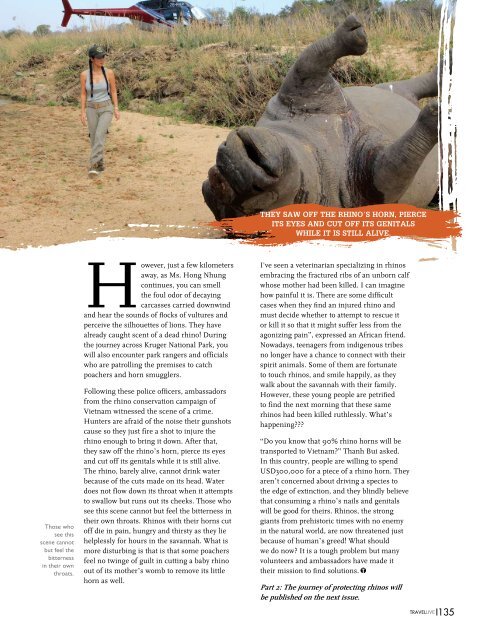TRAVELLIVE 2-2016
I have a three-year old daughter. To teach her basic science knowledge, I always play some interesting games with her. One of her most favorite games is “raining ice cube”. We put an ice cube above a glass of a little hot water. Some seconds later, tiny water droplets will fall down like a lovely “rain”. February comes, new season greets us with drizzling rain whose tiny droplets dampen our hair and shoulders, running down our windows and blurring the world across the pane. Once my daughter woke up early in the morning and pressed her face against the glass pensively, and asked me “Mommy Mommy, there are some ice cubes on our roof, right? Our house is warmer so it rains like this, huh?”
I have a three-year old daughter. To teach her basic science knowledge, I always play some interesting games with her. One of her most favorite games is “raining ice cube”. We put an ice cube above a glass of a little hot water. Some seconds later, tiny water droplets will fall down like a lovely “rain”. February comes, new season greets us with drizzling rain whose tiny droplets dampen our hair and shoulders, running down our windows and blurring the world across the pane. Once my daughter woke up early in the morning and pressed her face against the glass pensively, and asked me “Mommy Mommy, there are some ice cubes on our roof, right? Our house is warmer so it rains like this, huh?”
You also want an ePaper? Increase the reach of your titles
YUMPU automatically turns print PDFs into web optimized ePapers that Google loves.
Those who<br />
see this<br />
scene cannot<br />
but feel the<br />
bitterness<br />
in their own<br />
throats.<br />
However, just a few kilometers<br />
away, as Ms. Hong Nhung<br />
continues, you can smell<br />
the foul odor of decaying<br />
carcasses carried downwind<br />
and hear the sounds of flocks of vultures and<br />
perceive the silhouettes of lions. They have<br />
already caught scent of a dead rhino! During<br />
the journey across Kruger National Park, you<br />
will also encounter park rangers and officials<br />
who are patrolling the premises to catch<br />
poachers and horn smugglers.<br />
Following these police officers, ambassadors<br />
from the rhino conservation campaign of<br />
Vietnam witnessed the scene of a crime.<br />
Hunters are afraid of the noise their gunshots<br />
cause so they just fire a shot to injure the<br />
rhino enough to bring it down. After that,<br />
they saw off the rhino’s horn, pierce its eyes<br />
and cut off its genitals while it is still alive.<br />
The rhino, barely alive, cannot drink water<br />
because of the cuts made on its head. Water<br />
does not flow down its throat when it attempts<br />
to swallow but runs out its cheeks. Those who<br />
see this scene cannot but feel the bitterness in<br />
their own throats. Rhinos with their horns cut<br />
off die in pain, hungry and thirsty as they lie<br />
helplessly for hours in the savannah. What is<br />
more disturbing is that is that some poachers<br />
feel no twinge of guilt in cutting a baby rhino<br />
out of its mother’s womb to remove its little<br />
horn as well.<br />
I've seen a veterinarian specializing in rhinos<br />
embracing the fractured ribs of an unborn calf<br />
whose mother had been killed. I can imagine<br />
how painful it is. There are some difficult<br />
cases when they find an injured rhino and<br />
must decide whether to attempt to rescue it<br />
or kill it so that it might suffer less from the<br />
agonizing pain”, expressed an African friend.<br />
Nowadays, teenagers from indigenous tribes<br />
no longer have a chance to connect with their<br />
spirit animals. Some of them are fortunate<br />
to touch rhinos, and smile happily, as they<br />
walk about the savannah with their family.<br />
However, these young people are petrified<br />
to find the next morning that these same<br />
rhinos had been killed ruthlessly. What’s<br />
happening???<br />
“Do you know that 90% rhino horns will be<br />
transported to Vietnam?” Thanh Bui asked.<br />
In this country, people are willing to spend<br />
USD300,000 for a piece of a rhino horn. They<br />
aren’t concerned about driving a species to<br />
the edge of extinction, and they blindly believe<br />
that consuming a rhino’s nails and genitals<br />
will be good for theirs. Rhinos, the strong<br />
giants from prehistoric times with no enemy<br />
in the natural world, are now threatened just<br />
because of human’s greed! What should<br />
we do now? It is a tough problem but many<br />
volunteers and ambassadors have made it<br />
their mission to find solutions.<br />
Part 2: The journey of protecting rhinos will<br />
be published on the next issue.<br />
<strong>TRAVELLIVE</strong> 135
















